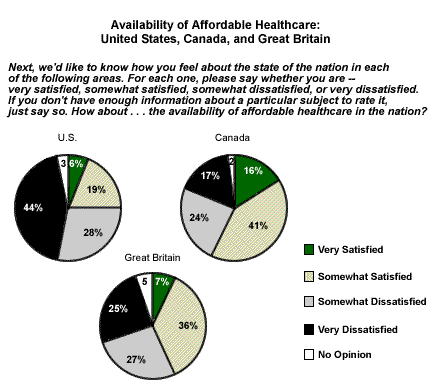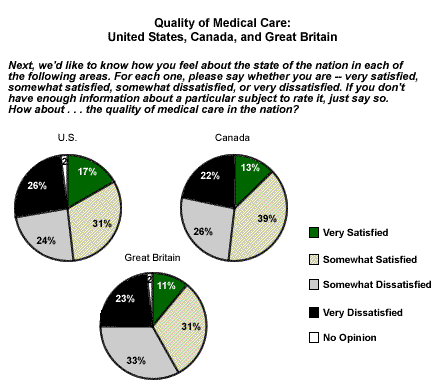The healthcare systems in the United States, Canada, and Great Britain provide interesting comparisons to one another, especially since the U.S. system is considered private and Canada and Great Britain each have national health systems that supply universal coverage. National health systems are theoretically designed to provide accessible, affordable care for all segments of the population, but critics of such systems often question the quality of that care. Conversely, critics of the U.S. system often point to the fact that affordable, high-quality healthcare is not equally available to all who need it.
How do Americans, Canadians, and Britons compare in their views of the availability and quality of healthcare in their respective countries? In surveys conducted in January* and February 2003**, Gallup asked residents of these three nations identical questions regarding the availability of affordable healthcare and the quality of medical care.
The Availability of Affordable Healthcare
One-fourth of American respondents are either "very" or "somewhat" satisfied with "the availability of affordable healthcare in the nation," (6% very satisfied and 19% somewhat satisfied). This level of satisfaction is significantly lower than in Canada, where 57% are satisfied with the availability of affordable healthcare, including 16% who are very satisfied. Roughly 4 in 10 Britons are satisfied (43%), but only 7% say they are very satisfied (similar to the percentage very satisfied in the United States).
Looking at the other side of the coin, 44% of Americans are very dissatisfied with the availability of affordable healthcare, and nearly three-fourths (72%) are either somewhat or very dissatisfied. The 44% in the United States who are very dissatisfied with healthcare availability is significantly higher than corresponding figures in either Canada (17%) or Great Britain (25%).

The views of Americans on the quality of medical care in their country are not overly different -- 48% of Americans, 52% of Canadians, and 42% of Britons say they are satisfied. However, Americans are slightly more likely than Canadians or Britons to rate this issue at one extreme or the other. The proportion of respondents who are very (as opposed to somewhat) satisfied with the quality of healthcare in the United States is 17%, while the proportion who are very dissatisfied is 26% -- so 43% of Americans fall at the extremes of this scale. In the other two countries, the middle ground of "somewhat" satisfied or dissatisfied respondents tends to be larger. In Canada, 13% are very satisfied, while 22% are very dissatisfied -- so 35% of the public is at the extremes. In Great Britain, 11% are very satisfied, while 23% are very dissatisfied -- a total of 34% is at the extremes.

Bottom Line
In all three countries, there is great variation of opinion within the population on both the quality of medical care and the availability of affordable healthcare. It is a testament to national health systems that people in Canada and Great Britain are significantly more satisfied with availability of affordable healthcare than their American counterparts are.
In Great Britain, satisfaction with access to affordable healthcare (43%) is consistent with satisfaction with quality (42%). In Canada, satisfaction with access to affordable healthcare (57%) is slightly higher than satisfaction with quality (52%). But the most dramatic variation in satisfaction with these two facets of the healthcare system occurs in the United States, where only 25% are satisfied with the availability of affordable healthcare, but 48% are satisfied with quality. Once again, this dichotomy seems to support the hypothesis that private healthcare encourages high-quality standards, but may be a barrier to access and affordability.
On a less relative basis, the fact that 72% of Americans say they are dissatisfied with the availability of affordable healthcare, and 50% are dissatisfied with the quality of medical care are cause for concern. Regardless of how these numbers measure up to those in Canada and Great Britain, they indicate that the U.S. healthcare system has considerable room for improvement.
*Results are based on telephone interviews with 1,000 national adults, aged 18 and older, conducted Jan. 13-16, 2003. For results based on the total sample of national adults, one can say with 95% confidence that the maximum margin of sampling error is ±3%.
**Canadian results are based on telephone interviews with a randomly selected national sample of approximately 1,000 Canadian adults, aged 18 and older, conducted Feb. 3-9, 2003. For results based on this sample, one can say with 95% confidence that the maximum error attributable to sampling and other random effects is ±3%.
British results are based on telephone interviews conducted by the Gallup U.K. poll with approximately 500 respondents, aged 18 and older, from across Great Britain, conducted Jan. 29-Feb. 10, 2003. For results based on this sample, one can say with 95% confidence that the maximum error attributable to sampling and other random effects is ±5%.